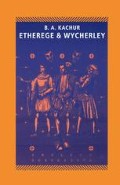Abstract
The excitement generated by Etherege’s first play, The Comical Revenge (1664), clearly endured the four-year hiatus until the première of his next comedy, for when She Would If She Could opened on 6 February 1668, the Duke of York’s Theatre immediately filled to capacity. Regrettably, for those who attended the opening performance, She Would If She Could did not meet with the same degree of success accorded his first comedy. The inveterate playgoer Samuel Pepys found ‘nothing in the world good in it’, adding that patrons in the pit ‘blame the play as a silly, dull thing, though there was something very roguish and witty; but the design of the play, and end, mighty insipid’.1 Etherege attributed the play’s failure to the actors’ lack of preparation and unfamiliarity with their lines, and his accusations were corroborated a few years later by Thomas Shadwell, who, in his preface to The Humorists (1671) — a play also hampered by poor acting on its première — remarked that ‘imperfect Action, had like to have destroy’d She would if she could’. However, regardless of the reasons for the cool reception at the première, the play’s initial failure did not eclipse its dramatic merits: John Dennis, in his Epistle Dedicatory to The Comical Gallant (1702), said ‘it was esteem’d by the Men of Sense, for the trueness of some of its Characters, and the purity and freeness and easie grace of its dialogue’ — distinctive dramatic qualities that earned it performances at Whitehall and praise in Shadwell’s preface as ‘the best Comedy that has been written since the Restauration of the Stage’.2
Preview
Unable to display preview. Download preview PDF.
Notes
Henry B. Wheatley (ed.), The Diary of Samuel Pepys (London: Bell, 1893), VII, pp. 307–8.
Laura Brown, English Dramatic Form, 1660–1760 ( New Haven, CT: Yale University Press, 1981 ), p. 30.
William Oldys, ‘Sir George Etherege’, Biographia Britannica (rpt. Hildesheim, Germany: Georg Olms, 1969), III, 1842.
Susan Staves, ‘The Secrets of Genteel Identity in The Man of Mode: Comedy of Manners vs. the Courtesy Book’, Studies in Eighteenth Century Culture, 19 (1989): 117.
Robert Wess, ‘Utopian Rhetoric in The Man of Mode’, The Eighteenth Century: Theory and Interpretation, 27, 2 (Spring 1986 ): 147.
Charlene Taylor (ed.), She Would If She Could (Lincoln: University of Nebraska Press, 1971), p. xxv.
Edward Burns, Restoration Comedy: Crises of Desire and Identity ( New York: St. Martin’s Press, 1987 ), p. 34.
Author information
Authors and Affiliations
Copyright information
© 2004 B.A. Kachur
About this chapter
Cite this chapter
Kachur, B.A. (2004). She Would If She Could: Comedy of Manners. In: Etherege & Wycherley. English Dramatists. Palgrave, London. https://doi.org/10.1007/978-1-137-04779-3_4
Download citation
DOI: https://doi.org/10.1007/978-1-137-04779-3_4
Publisher Name: Palgrave, London
Print ISBN: 978-0-333-57541-3
Online ISBN: 978-1-137-04779-3
eBook Packages: Palgrave Literature & Performing Arts CollectionLiterature, Cultural and Media Studies (R0)

